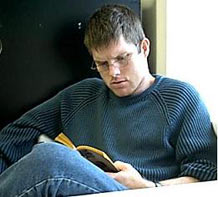 Thursday, August 04, 2005
Thursday, August 04, 2005
odd inspiration.
The other day I had a conversation with composers Al Theisen and Marc Ballard about inspiration. We began talking about weird noises or happenings that have inspired us.
My story of odd inspiration:
I was shopping with my wife when I heard a cell phone ringing on the next aisle. I know I must have incorrectly heard the ring tones but it sounded like a very odd Ligeti-esque ringtone. It also reminded me of the French composer Christian Lauba who writes a lot of music for the saxophone using vast amounts of extended techniques.
The owner of the cell phone answered it quite promptly, so I did not hear it ring a second time. For the rest of the day I kept thinking that the ringtone could not have possibly sounded the way I heard it. I thought it sounded really cool, but hearing only part of the ringtone from a distance must have distorted it (at least in my ear's opinion).
The snippet kept playing in my head, stuck on repeat. A few days later, I began working on a solo alto saxophone piece entitled, Figment. The ringtone became the inspiration for the fast very active last part of Figment. The section uses a few different multiphonics and overall it sounds similar to what I heard that day in the department store.
posted by Everette Minchew
3:02 PM
|
|
 Composer Everette Minchew (born 1977) is consistently active in the creation, performance, and promotion of contemporary music. Moderately prolific, his catalogue includes small chamber pieces for violin, piano, various wind instruments, harpsichord and electronic music. Current commissions include a string trio and an opera based on an 11th-century crusades tale.
His earliest musical training came at the age of eleven when he began playing alto saxophone; it wasn’t long until he began his first attempts in composition.
Composer Everette Minchew (born 1977) is consistently active in the creation, performance, and promotion of contemporary music. Moderately prolific, his catalogue includes small chamber pieces for violin, piano, various wind instruments, harpsichord and electronic music. Current commissions include a string trio and an opera based on an 11th-century crusades tale.
His earliest musical training came at the age of eleven when he began playing alto saxophone; it wasn’t long until he began his first attempts in composition.
He received a Bachelor’s Degree in Music History from the University of Southern Mississippi, where he studied saxophone under world-renowned soloist, Lawrence Gwozdz.
Fearing that traditional university training would hinder his development as a progressive composer, he abandoned the idea of formal lessons in favor of an intense private study of modern masterworks.
Minchew's works are characterized by their intense timbral explorations and brutal dissonance. That is not to say, however, that the compositions are devoid of beauty. In the first of the Two Brief Pieces, for example, the harpsichord chimes stringent yet haunting chords evoking a sense of loss.
Other pieces, like the Figment No. 2 "Juggler's Fancy" play upon the kaleidoscopic interaction between timbres and tones. The rapid alternation of pizzicato, arco bowing, and extreme glissandi remind the listener of Xenakis coupled with a Berio Sequenza. Minchew's Invention "Two-Part Contraption" for piano owes much to Ligeti's etudes and boogie-woogie jazz.
His music has been performed around the United States, and he was the featured composer at the 2005 Intégrales New Music Festival in Hattiesburg, Mississippi.
He currently resides in Hattiesburg, Mississippi with his wife, Cheryl.
CONTACT INFORMATION
| |



